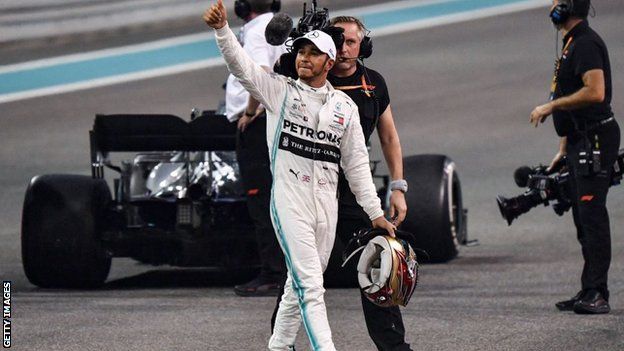Coronavirus: Formula 1 teams agree rules change delay & flexible 2020 race calendar
- Published

Lewis Hamilton won the 2019 F1 drivers' championship with Mercedes
Formula 1 bosses have agreed to delay the planned 2021 rules until 2022 and to work to squeeze as many races into this season as possible.
The moves are a response to the coronavirus crisis, which has thrown the new season into disarray.
The prospect of a reduced calendar means a drop in income for F1 and the teams, which is the main reason for delaying the major rules change.
All accept the need to be flexible about the calendar once racing starts.
The decisions stem from a meeting on Thursday involving all the team bosses, F1 chairman Chase Carey and managing director Ross Brawn, and Jean Todt, president of governing body the FIA.
The key decisions of the meeting were as follows:
F1 has the right to set the calendar this year to speed up planning, rather than the usual consultation process, although it will still co-ordinate with the teams to ensure plans are feasible
Race weekends could be reduced from three days to two, in which case a working group would be set up to decide the exact format
The 2021 regulations will be deferred until 2022
Under the current rules, which now will run into 2021, aspects of the cars' designs will be frozen while some will remain free for development; details will be resolved following talks
The idea of lowering the budget cap in 2021 from its existing figure of $175m will be discussed
Nine of the 10 teams had already agreed to delay the introduction of the 2021 rules, which demand significant changes to the cars with the aim of promoting better and closer racing.
Only Ferrari asked for more time to consider the idea, and team boss Mattia Binotto backed it at the meeting on Thursday.
Although the technical rules have been delayed, F1 will still introduce in 2021 the planned budget cap of $175m a year, barring some exemptions such as driver salaries. And changes to the sporting rules which modify aspects of the race weekend will also come into force.
The decision means teams will race in 2020 and 2021 under the existing rules, which will deliver a major cost saving at a time when all are likely to suffer a drop in income, which primarily comes from race-hosting fees and broadcast rights.
And it was agreed that teams will use their 2020 chassis, the survival cell in which the driver sits, again in 2021.
The decision to support F1 and the FIA by accepting maximum flexibility on a revised calendar is an attempt to ensure that as many races as possible can be squeezed into this season once racing can start again.
The first seven races in Australia, Bahrain, Vietnam, China, the Netherlands, Spain and Monaco have all been postponed.
F1 is hoping to start the season "as soon as possible after May".
A year has to have a minimum of eight grands prix to count as a World Championship.